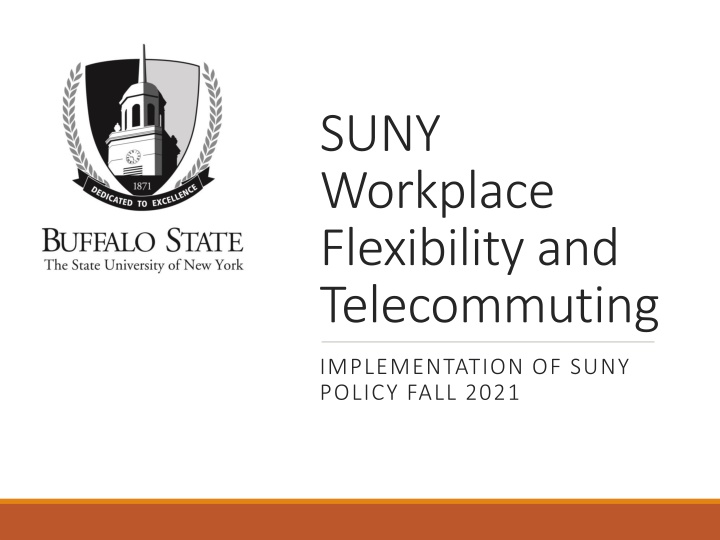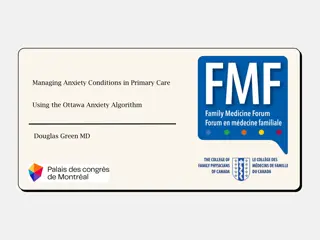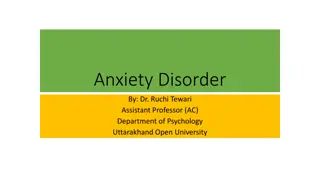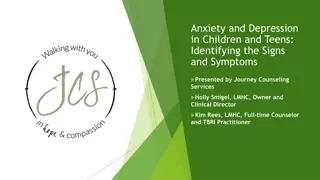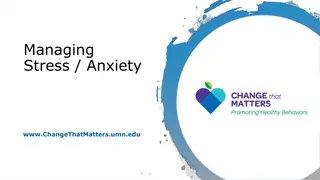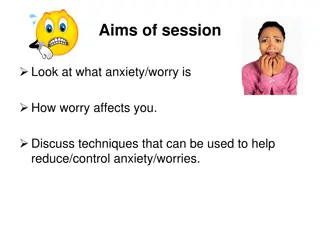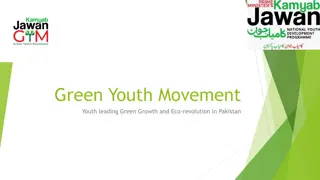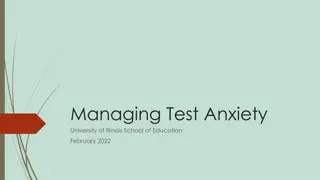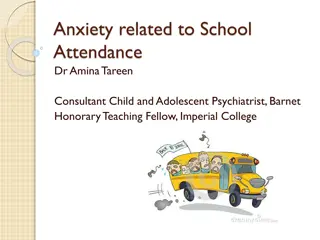Eco-Anxiety: A Major Challenge for Our Generation
Eco-anxiety is a growing concern globally, with individuals experiencing distress due to heightened awareness of climate change. This study delves into the impact of eco-anxiety on individuals and explores how it motivates proactive measures for the environment. Through qualitative research methods, the study uncovers key themes related to emotional management, political and environmental engagement, social responsibility, resources, social impact, and future perspectives.
Uploaded on Apr 04, 2025 | 0 Views
Download Presentation

Please find below an Image/Link to download the presentation.
The content on the website is provided AS IS for your information and personal use only. It may not be sold, licensed, or shared on other websites without obtaining consent from the author.If you encounter any issues during the download, it is possible that the publisher has removed the file from their server.
You are allowed to download the files provided on this website for personal or commercial use, subject to the condition that they are used lawfully. All files are the property of their respective owners.
The content on the website is provided AS IS for your information and personal use only. It may not be sold, licensed, or shared on other websites without obtaining consent from the author.
E N D
Presentation Transcript
SUNY Workplace Flexibility and Telecommuting IMPLEMENTATION OF SUNY POLICY FALL 2021
Policy Overview Supports telecommuting arrangements where it is reasonable to do so based on the college s mission, operational and program needs. Provides management with ability to offer workplace flexibility that may attract and retain a diverse, high performing workforce. No employee may telecommute for their full obligation. Maximum allowable days per pay period (2-week period) is five (5) days. (up to 50% of an obligation) SUNY Telecommuting Program is a pilot effective immediately and shall end June 30, 2022, unless extended by SUNY.
Policy Overview Every application will be considered on an individual basis. Determinations as to which job functions are eligible for telecommuting is subject to management s discretion and based on operational needs. Employee s ability to effectively perform work functions in a telecommuting setting will be considered in approval of the plan. Supervisors must ensure equity when evaluating the operational need for telecommuting arrangements.
Application Process Employees are encouraged to discuss their interest in participating with their supervisor prior to submitting an application. Employees may submit an application beginning September 15 and shall review the SUNY Workplace Flexibility and Telecommuting Policy. Applications to participate must be evaluated, reviewed, documented, and approved by the supervisor, department head, and Cabinet member. All approved requests will be forwarded to HR for tracking. HR will provide confirmation to the employee to begin arrangement. Telecommuting work arrangements shall not commence until it has received written final approval.
Application Approved HR will provide confirmation to the employee to begin arrangement. Telecommuting arrangements may be modified, cancelled, or suspended at any time by management, in consultation with HR. Employees must submit to their immediate supervisor Telecommuting Program Biweekly Progress Reports describing work completed while telecommuting. Failure to do so will result in cancellation of their telecommuting arrangement. Employee can be expected to be on campus on a day that is scheduled for remote work and they do not have to receive another day remote in exchange.
Application Denied If an application is denied, an explanation of the basis for the denial will be provided to the employee. Employees may appeal to HR in writing within 7 calendar days following receipt of the denial. Appeals shall state the reasons for disagreement with management s determination. The policy does not support medical or leave requests. There is a separate process for such requests.
Supervisor Considerations The proposed telecommuting work does not require in-person student or constituent interaction, classroom presence, and the work is typically performed away from the end customer (i.e., student). The work can be performed as effectively from a telecommuting location as a campus location. The telecommuting arrangement does not necessitate the transfer of work which increases the workload to co-workers on campus. The assignments completed in the telecommuting location are consistent with the employee s performance program and scope of responsibilities, or job description based on civil service title.
Supervisor Considerations Key performance metrics such as quality of work products, quantity of work produced, response time/turnaround time, level of service, etc. are measurable and are routinely measured and assessed consistent with the employee s regular professional obligation or job description. The immediate supervisor is accountable for communicating performance expectations, monitoring and measuring performance, providing ongoing performance feedback and formally addressing performance issues. Telecommuting arrangements are reviewed for effectiveness on an ongoing basis and in conjunction with the ongoing assessment of the employee s performance.
For Employees Prepare for a meeting with your supervisor: Read the Flexibility and Telecommuting Policy Ask yourself if remote work is realistic or permissible for your type of work Note remote work is a privilege and not an entitlement or guarantee Schedule consistency is required and you must continue to meet your professional obligations Your performance will determine if the agreement continues. You must submit the Telecommuting Program Biweekly Progress Reports describing work completed while telecommuting. Failure to do so will result in cancellation of their telecommuting arrangement
For Employees If you are contemplating applying: Meet one-on-one with you supervisor to discuss pros and cons before applying Consider what you would like to do and why Draft a work plan/schedule and a communication plan Think about the impact on the team and what is expected of your unit Remember the pilot allows up to 50% of time per pay period for full- time employees, pro-rated for part-time employees. No employee may telecommute for their full obligation
For Employees Sample telecommuting schedule options include: Working remotely 1 or more days a week, no more than 5 days per pay period A combination of half days, morning or afternoon
For Employees Meeting with your supervisor: Ask questions Tell them what you would like to do and why Present your draft work plan/schedule and a communication plan Be prepared to explain how you will meet your professional obligations Talk about what you did to make your previous remote work successful Discuss who may be impacted by your remote work Ask supervisor what feedback or concerns they may have and ask for clarification about their expectations
For Employees Meeting with your supervisor continued: If your supervisor requests changes to your telecommuting plan, agree to follow up and work on the adjustments Keep in mind your supervisor has a team of people to consider and not every position is conducive for telecommuting Your supervisor does not have final approval of the request; your division s Cabinet member has final approval. If approved, HR will provide confirmation to you to begin the arrangement If denied, your supervisor will follow up with you
Application Approved Employee Protocol If your request is approved: The people we serve, on and off campus, should have no indication of whether or not you are working remotely. Employee must be transparent and consistent with their schedule and work documentation Employee must submit to their immediate supervisor the Telecommuting Program Biweekly Progress Reports describing work completed while telecommuting. Failure to do so will result in cancellation of your telecommuting arrangement. Employee must be available and reachable during scheduled work hours Discuss with your supervisor how the arrangement is working during your one-on-one meetings
Application Approved Employee Protocol If your request is approved: Employee must answer and respond to phone calls and emails promptly and without away/out of the office messages Employee must maintain their unit s service, work, and response standards Employee can be expected to be on campus on a day that is scheduled for remote work and they do not have to receive another day remote in exchange If you become ill and cannot work while working remotely, you will need to charge accruals. Or if you need to take an unscheduled day off, you will need to request time off and use your accruals
Documents and Contact SUNY Workplace Flexibility and Telecommuting Policy Application Telecommuting Program Biweekly Progress Report Telecommuting Application Review Guide for Employees Contact HR with any questions at 878-3042 or e-mail Erika Grande at GRANDEEZ@BuffaloState.edu
